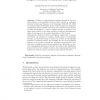Free Online Productivity Tools
i2Speak
i2Symbol
i2OCR
iTex2Img
iWeb2Print
iWeb2Shot
i2Type
iPdf2Split
iPdf2Merge
i2Bopomofo
i2Arabic
i2Style
i2Image
i2PDF
iLatex2Rtf
Sci2ools
120
click to vote
TCC
2005
Springer
2005
Springer
Adaptive Security of Symbolic Encryption
Abstract. We prove a computational soundness theorem for the symbolic analysis of cryptographic protocols which extends an analogous theorem of Abadi and Rogaway (J. of Cryptology 15(2):103ŌĆō127, 2002) to a scenario where the adversary gets to see the encryption of a sequence of adaptively chosen symbolic expressions. The extension of the theorem of Abadi and Rogaway to such an adaptive scenario is nontrivial, and raises issues related to the classic problem of selective decommitment, which do not appear in the original formulation of the theorem. Although the theorem of Abadi and Rogaway applies only to passive adversaries, our extension to adaptive attacks makes it substantially stronger, and powerful enough to analyze the security of cryptographic protocols of practical interest. We exemplify the use of our soundness theorem in the analysis of group key distribution protocols like those that arise in multicast and broadcast applications. Speci’¼ücally, we provide cryptographic de’¼...
Computational Soundness Theorem | Cryptographic Protocols | Cryptography | Soundness Theorem | TCC 2005 |
Related Content
| Added | 28 Jun 2010 |
| Updated | 28 Jun 2010 |
| Type | Conference |
| Year | 2005 |
| Where | TCC |
| Authors | Daniele Micciancio, Saurabh Panjwani |
Comments (0)

